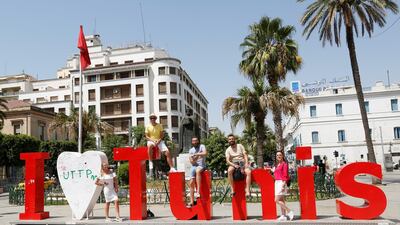Along the brightly lit alleys of the World Travel Market (WTM) exhibition at London’s Excel centre this month, it seemed experts on every stand had a story to tell.
For Caribbean islands, ravaged by hurricanes in September, the talk was of overcoming the legacy of natural disasters causing hundreds of deaths and damage estimated in the billions of dollars.
The region attracted a record 30 million visitors in 2016 and predicts further growth this year, although market expansion is expected to slow down following the hurricanes.
On other stands, economic issues from Brexit to domestic crises were cited as reasons for concern.
But when travel professionals discuss the challenges their industry faces, it is the threat of terrorism that dominates the thoughts of many.
Few countries have suffered as badly from the effects of extremist violence, or fear of it, as Tunisia and Egypt.
Tunisia offers a striking example of not only the impact of terrorism but the ability of a nation to triumph over adversity and rebuild a damaged industry.
The North African state relies heavily on holidaymakers as a source of foreign income, accounting for up to 8 per cent of GDP and giving employment to more than 400,000 people directly and indirectly.
The industry was showing signs of recovery from the repercussions of the Arab Spring when a series of deadly terrorist attacks in 2015 all but wrecked confidence.
Twenty-two people were murdered at the Bardo National Museum, 38 more later in the same year in an attack on a beach resort near Sousse and 12 in the suicide bombing of a police bus in the capital Tunis.
____________
Read more:
EgyptAir signs Dreamliner leasing deal with Boeing and AerCap
Tillerson discusses terrorism with Saudi's Crown Prince
Lebanon president rejects 'terrorism' suggestion, Hariri heads to Egypt
____________
Thirty of those killed in the resort attack were British, prompting the UK government to advise against any but essential travel to Tunisia. That guidance was not softened until this summer, although non-essential travel to the south of the country, and especially visits to areas close to the Algerian and Libyan borders, is still discouraged.
The 2015 attacks on westerners inflicted devastating harm. Tour companies and cruise operators saw little choice but to drop Tunisia as a destination.
But, after fierce criticism of inadequate measures to protect holidaymakers, a strong response from the authorities has so far prevented further outrages. Tourist numbers had fallen to historically low levels, with a 25 per cent slump after the beach attack, but people are returning.
The Tunisian government predicts that arrivals will reach 6.5 million this year, the best since the highs recorded before the Arab Spring.
“Nowhere is completely safe and embracing the same values as Europe made us a prime target in the twisted ideology behind the attacks,” said Sami Tounsi, a trade manager for the Tunisian National Tourist Office in the UK at the WTM. “But Tunisia is proving it is as safe as anywhere.“
At the Egyptian stand, meanwhile, officials were also buoyant. Tarek Elbagoury, the managing director of Egypt Promotion, said his country was on target to return to 2010 levels of visits by next year. This comes after numbers collapsed following deadly attacks that included, in October 2015, a Metrojet flight from Sharm El Sheikh airport coming down in the Sinai Peninsula killing all 224 on board, apparently the result of an ISIL bomb. The terrorist group has repeatedly said it was responsible, though this has not been conclusively verified. There have also been attacks on Coptic Christians in Cairo, Tanta, Alexandria and Minya and - twice, this year and last - on foreign tourists at the Red Sea resort of Hurghada..
But the Association of British Travel Agents (ABTA) confirms impressions of resilience in the country's tourism sector.
Early bookings for next summer are up 26 per cent for Egypt but down by 5 per cent for Portugal. That country is among those that usually benefit from a downturn in locations where tourists have been targeted, although Portugal has suffered a summer of wildfires that killed many scores of people.


